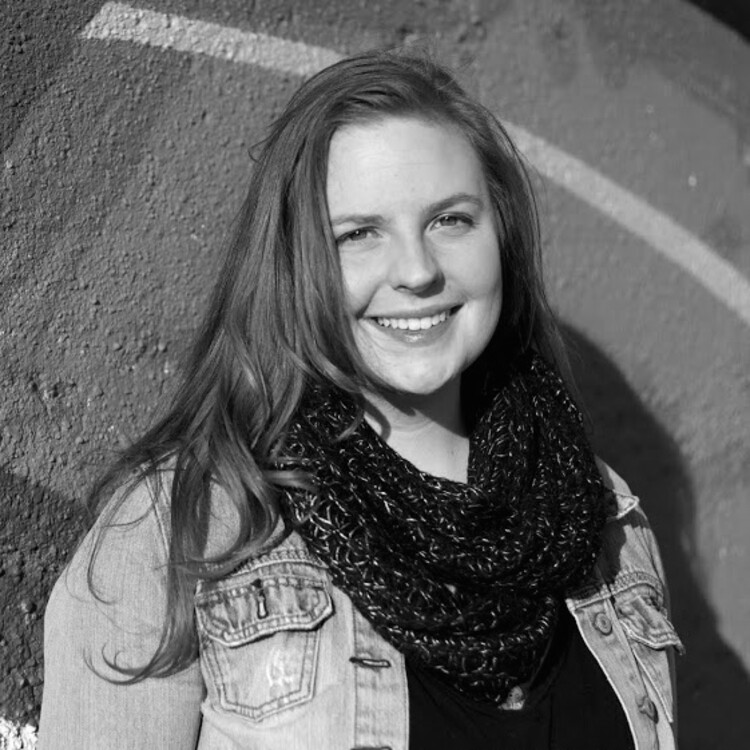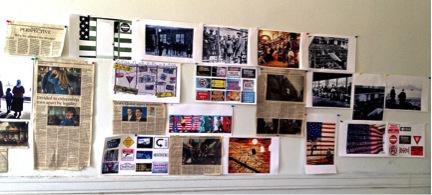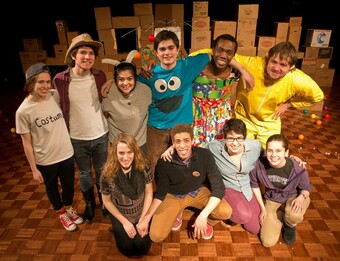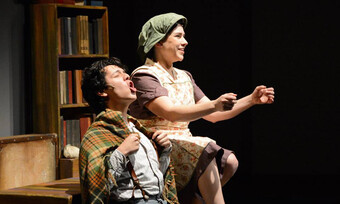About Face Youth Theatre
Checking, Expanding, and Activating Boxes
A series that explores youth ensembles in Chicagoland, the communities that encourage them, and how young people create theater for young people.
Nobody is relegated to a second-class status when it comes to love.
—Governor Pat Quinn
Nobody should be relegated to a second-class status. Period.
—The About Face Youth Theatre Ensemble
In About Face Youth Theatre (AFYT)’s rehearsal space, there is a cluster of post-it notes on the wall titled “Where I Started.” The ensemble’s first impressions range from “not being satisfied” to “ready to just do something” to “oblivion.” These notes relate to the process of AFYT’s current play investigating the intersection of undocumented and LGBTQIA youth, Checking Boxes. They are complemented by a recent timeline detailing US immigration reform, collaged images of multigenerational US immigrants, and statistics concerning undocumented youth. AFYT’s space also features a white board with the latest ensemble playlist featuring a genre-bending mix of “Turn Down for What,” “Rhythm is a Dancer,” and “Corner of the Sky.” The space suits AFYT—voracious, cerebral, playful, and impossible to place into a single box.
Over the course of one year at AFYT, a group of fourteen- to twenty-three-year-olds come together to make change through art. Education and Outreach Director Ali Hoefnagel begins by asking them, “What do you care about?” The AFYT Youth Task Force, which is comprised of older members of the ensemble, leads a yearly retreat for potential topic consideration. Drawing from radical youth empowerment pedagogy, AFYT directors offer agency tools to the youth, and then step back to lead by listening. Delving into complex issues that no one can claim to be expert in creates a context of equality among the ensemble. Fall brings intensive research surrounding the chosen topic, followed by workshops in the spring that lead to the creation of a script. Hoefnagel believes youth asserting identities speaks to the effectiveness of the devising process—it pushes them to find answers to their own questions and believe in those answers.
A second cluster of post-it notes in AFYT’s rehearsal space titled “Where I Changed” offers up the most compelling evidence of the power of the ensemble in the lives of its members: “5252 North Broadway”—AFYT’s home base. When asked to describe AFYT, ensemble member Jimbo Pestano said, “Coming to rehearsal lifts you up.” Collectively, the ensemble speaks five languages, attends various universities, and has worked extensively throughout Chicago theater. They are multifaceted performers and all have something to say.
Artist, activist, and playwright Shannon Matesky guided the creation of the ensemble’s soaring script for Checking Boxes through a rehearsal process that made the political veneer personal. Through spoken word, live music and the harrowing tale of undocuqueer youth Donny, Checking Boxes exposes the challenges of thriving in Chicago’s LGBTQIA and immigrant communities. It serves as reminder of the human lives behind politicized stories of identity.
Boxes is hitting Chicago at a pivotal moment in the undocuqueer movement. Undocumented spouses cannot gain access to citizenship through partner sponsorship in states without marriage equality. Undocumented immigrants in detention centers face higher rates of violent harassment and lack proper healthcare—with HIV positive and transgender people suffering the most. The threat of deportation back to an oppressive environment presents the possibility for dire repercussions. The most urgent immigration stories remain those of the thousands of undocumented youth making it across the border alone. Despite empathy gains for the LGBTQIA community in this country, polarizing dialogue surrounding undocumented immigrants exhibits an astonishing lack of compassion.
Chicago claims to foster diversity, but as explained by ensemble member Liam Camarillo, it’s too often “segregated diversity.” The past year in Chicago saw a fiery debate around the location of a homeless center for LGBTQ youth in proximity to a historically friendly LGBTQ neighborhood. Thinly veiled racist cries of an increase in crime set off by these troubled youth, many undocumented, permeated the dialogue in a city too readily deemed progressive.
The most bleakly stamped neighborhoods have stories—not just of violence—to share, and touring Checking Boxes through Chicago parks activates these spaces. Rather than combatting the upper class social mores the professional theater has acquired over the years, AFYT embraces spatial, financial and audience limitations. Their unfettered style fosters community in a space removed from formality. The “free performance in a park” model proves that it is possible to create socially significant work without pandering to a specific community or charging exorbitant prices.
As the Checking Boxes team connected to the community, the community brought “checking boxes” moments to them. The ensemble was on the train when a man hailed insults at them about their sexuality. Ensemble member Da Shona Johnson responded first, with power gained from rehearsal discussions. Matesky also witnessed a bus fight that was followed by a slew of officers discovering an undocumented man. She tried to intervene as police pressured him for information, aware of the systems at play that could deport him, but was unsuccessful. During the performance I witnessed, a meta-Checking Boxes moment occurred during the talkback when an audience member asked if any of the ensemble was “gay” or “undocumented.” After silence, an ensemble member answered: “It doesn’t really matter. The reality is that there are people that identify as both, and that should be enough for all of us to take action.”
The final assemblage of post-its in the AFYT rehearsal room is titled “Where I Am.” Responses include: “home,” “hungry for more,” “this is some crazy shit” and finally, “with a lot of work ahead.” The AFYT ensemble is hungry to provide Chicago with the activist theater it might not yet know it wants, but desperately needs. In deciphering the junction between LGBTQIA identity and undocumented youth, AFYT arrived at the most enlightened education of all: that there is only more to learn, more to ask, and more work to be done.
Up next: Free Street and The Young Fugitives










Comments
The article is just the start of the conversation—we want to know what you think about this subject, too! HowlRound is a space for knowledge-sharing, and we welcome spirited, thoughtful, and on-topic dialogue. Find our full comments policy here